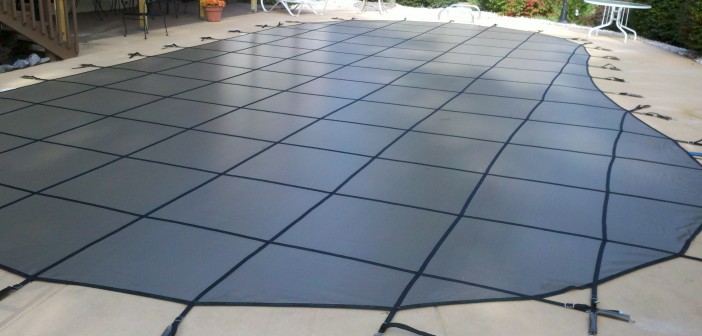-
Variety of Choices
There are several types of pool safety covers available, each with their own advantages and drawbacks, and the best choice will be determined by the needs of the situation. Mesh covers last longer and allow rain to pass through which also allows dirt and small debris into the pool, and solid covers are less durable but do not allow water to pass through. This is good for keeping the pool clean but does require the rainwater to be pumped out. Automatic covers are sturdy, safe and can support more weight than mesh or solid cover without the same issues, but a drawback is they are usually very expensive and can be prone to malfunction.
-
Specific Safety Concerns
Since the primary concern is safety, be certain that whichever safety cover you choose is up to ASTM F1346-91 safety standards. It needs to be easily removable in case of emergency and support plenty of weight, enough for a child and two adults. Your decision may require additional considerations to take into account such as pets, elderly, or ailing family members.
-
Size And Shape of Pool
If your pool is large or oddly shaped, then it may require a custom safety cover. These can be made to almost any specifications; however, the cost is going to be much higher. The expense tends to be in proportion with the cost of a pool instead of the size. “Depending on construction and design, accents like fountains or cascades might necessitate a custom safety cover for otherwise standard styles of swimming pools,” according to Poolsafe.
-
Pool Maintenance
Different types of safety covers demand varying degrees of upkeep. Keep in mind which chemicals are used to sanitize your pool, since either chlorine or salt can be corrosive for some materials. Another concern might be the start up in the spring, some options may create more work. While mesh covers let some dirt through, others that let too much light in can promote algae growth in warmer areas. Either can require rigorous cleaning and additional chemical treatments for the water.
-
Weather Extremes
The degree of weathering your safety cover is likely to experience is a significant concern, especially where extremes of hot or cold are common. Some materials can become brittle in freezing temperatures, others degrade after excessive exposure to heat and light. Rainfall may be another issue, so those living in wetter areas might prefer mesh safety covers to solid ones to avoid standing water, which can be breeding grounds for mosquitoes.
-
Price
Regardless of size, budgets always factor into any purchase, though probably more so with pool safety covers, so look for one with a good warranty. Cost can vary tremendously depending on the design and quality. Spending more may be worth it if it can ensure a safer home, but look for other ways to stay safe around the pool as well.
6 Important Factors about Pool Safety Covers
0
Share.




